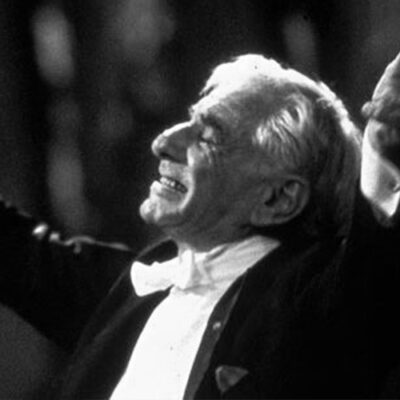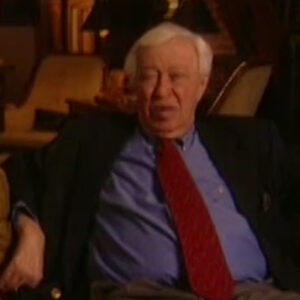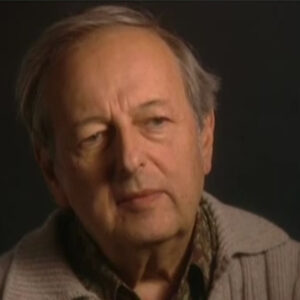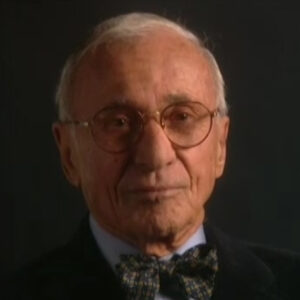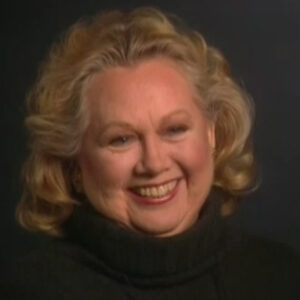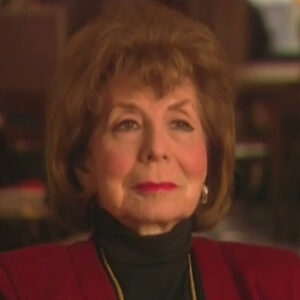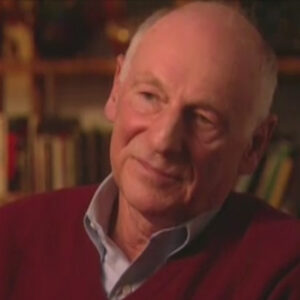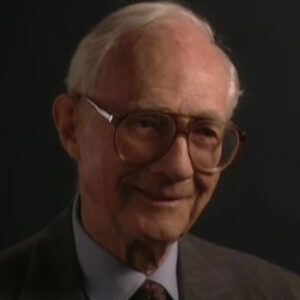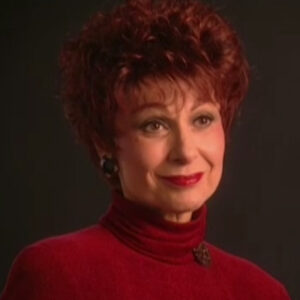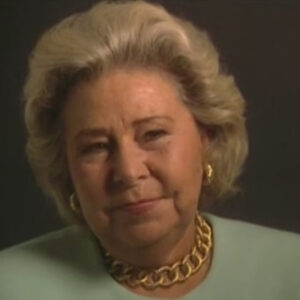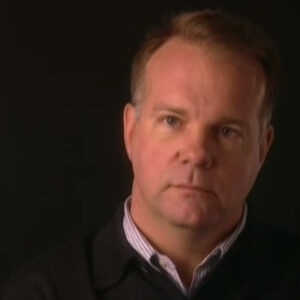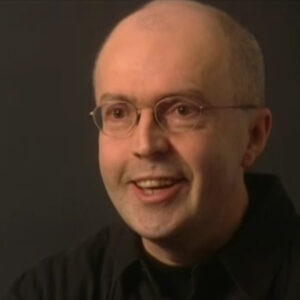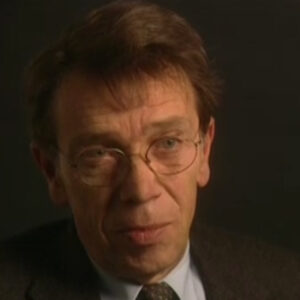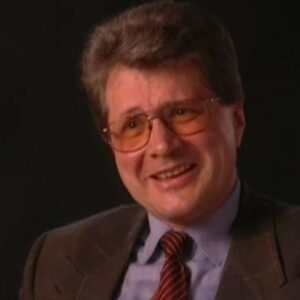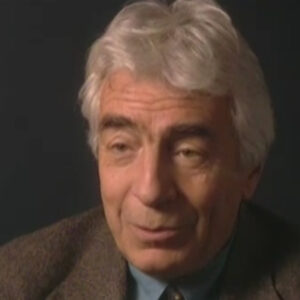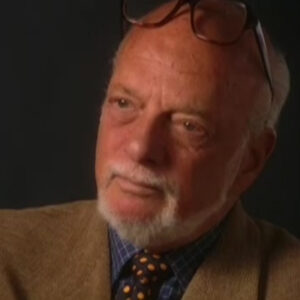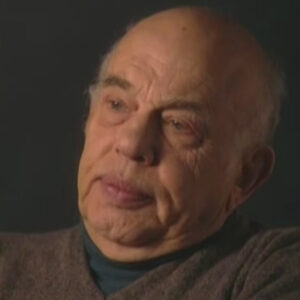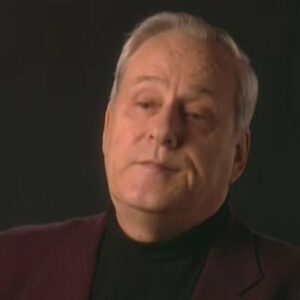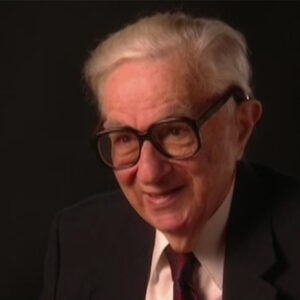Speaker I met him for the first time after Tanglewood in 1968. I had won the Koussevitzky prize and I had played the piano and I had conducted and I had done things with pop music and I had lectured and all sorts of things. People said, you’re so much like Lenny and you should really meet him. So after the summer was over, I went briefly to see him in New York, met him, and we had a wonderful first meeting. He asked me what my favorite piece was, and I sat out of the piano and played part of the last moment of Dossie from the Elder. That’s my favorite piece. And then we began talking about carful of Manuel Bach and Haydn and Mahler and Stravinsky and this sort of period of his testing. The range of my knowledge began. And yet but it was a it was a fun kind of testing. And he was always delighted when. I didn’t know what he wanted me to know and and then, of course, when he found out that I also knew and loved Emily Dickinson and Walt Whitman and Yiddish theater and all these other things, it was just, you know, like we’ve been family.
Speaker Did he comment on how much longer? He didn’t say anything about it really at that time. Then a year or so later when I had my dramatic debut take place and I think his was the first phone call I got the next morning, he read about it in the paper and he just said, I don’t believe it. I don’t believe it. I don’t believe it over and over again.
Speaker And then I think for a time, he really enjoyed the fact that certain portions of our lives seem to be running in a parallel history. You. The game of, you know, this, which was set for the test.
Speaker I think those two things were a little bit different from one another, the. Games were an essential part of Lenny’s approach to life and to music, and so this kind of testing thing, when you discovered a new area, then it was, aha. Now let’s explore this whole area and. I remember I was at a dinner with Lenny and Aaron Copeland once in the Berkshires, Tanglewood, and he said, yes, well, you know, all this area date stuff, but I bet you don’t know Gilbert Sullivan, which, of course, I did know frontwards and backwards. And thereupon we launched this whole medley of Gilbert and Sullivan patter songs getting louder and louder. And with Copeland saying, guys, you’re making a fuss. People are looking at us, which only made us get louder. And then that launched somehow into Stravinsky’s Leanna’s. And we gave a performance of Stravinsky’s Lenos using the cutlery and the glasses and whatever was available on the table, doing large sections of Lenos again getting louder and louder until Aronne just, you know, left the table. He just couldn’t take it.
Speaker So we shut up because he wasn’t their attention. Or was it? Was it it was too much for it.
Speaker Aaron was a gentleman and he didn’t want all this commotion and fuss. And he wanted to, you know, just quietly get on with his life.
Speaker What did you learn about you? What were you.
Speaker I had heard West Side Story, of course, and I had seen him on television a lot, and I frankly thought that a lot of his work on television was exaggerated over the top. I thought some of the comparisons that he made to young people’s concerts were perhaps not academically as sound as they should be or whatever. I mean, I was, you know, a young person measuring somebody who was very famous and saying, well, you know, how great is that? Really I. I was absolutely astonished when I did meet him to see that the depth of the knowledge, the consideration of every aspect of the music, the philosophy that everything was at such an intense level. I was overwhelmed by his preparation, his erudition, his curiosity, and coupled with that, his incredible sense of humor and patience in working with other people and bringing them up to the exciting and dangerous kind of music making that he wanted to do. Which various? Seeing him work must have been a performance that he did with the Boston Symphony Orchestra. I think the first time was the Boston Symphony Orchestra in Symphony Hall, he was conducting Beethoven’s Ninth for the first time in Boston for 20 years, and he was rehearsing with enormous attention to the heart of the piece and in the. Third movement, he was talking to the orchestra at some length about Inish Khayat and resignation and phrasing and movement and philosophy of many things, and one of the old timers in the clarinet section who had known him, of course, forever is stop, say, letting.
Speaker What do you want it louder, a softer you know, one of the oldest things in the book.
Speaker And Lenny was quiet for a second and looked at him and just said. I’d like a louder. And softer and a lot of other things. Well, that was like the comeback of comebacks and stopped all further discussion in that rehearsal other than focusing people’s attention that giving a performance of Beethoven’s Ninth was a very exalted and important thing to do.
Speaker At that point, he was rehearsing in an unusual way, he. At that point, he was rehearsing in a style that one could win at that time, he was using a kind of brinkmanship, rehearsal style. He would go into details very, very complex, very exact, how this note should be shaded, how this note should be attacked, how the vibrato should be more or less here. There are endless details. Even when the rehearsal time was limited, he relied on his star power to know that he could have over time and go through. But very often the orchestra had actually never played through the piece. And I think he liked that because he felt that under those conditions, they were scared. They didn’t know if it was all going to hold together. And they were absolutely focused on him being the one who was going to pull together the performance in later years. I saw that change. He began to more appreciate the kind of line he could get by allowing the players to play longer stretches of the pieces. And of course, he was developing relationships with only a very few orchestras that would really work to not only understand what he was asking for, but themselves to contribute to it. They were doing much more than just what they were asked. They were contributing lots of their own soul and hearts because they recognized that kindred spirit with him. Now, the first thing I saw, the first actual collaboration we had was, again, very brinkmanship sort of thing in Tanglewood. At the very last moment, I was called to conduct the offstage brass in Mahler’s 2nd Symphony, a piece which at that time I had heard but did not actually know. I had not been able to be at any of Lenny’s rehearsals because of some of the project I had at Tanglewood. And I went to have a meeting with him before the performance thinking, oh my God, how are we going to do this? I was very, very nervous not wanting to disappoint him. And I was full of questions about what will this be in two or three or four, you know, how do I wait or do I go for it? And I walked to the dressing room, he said.
Speaker You know, Muehler seconds, a big piece of mine, I’ve conducted it my whole life, I mean, everyone thinks of it, they practically wrote it. That’s what they are doing. And yet, you know, every time I’ve always done it with the score, I’ve never done it by heart. What do you think? I mean, should I take a chance? Should I do it by heart? He’s asking me this question. And I think well, I guess I mean, after all, I mean, if you do know what I mean, the orchestra knows it, you know it. And so, yeah, I mean, after all, what’s the worst that could happen? So, you know, it’s like I could get to the end of a passage someplace and I wouldn’t know, are there three bars here or four bars or five bars before something supposed to come in? And and that’s always the tough part. I mean, how many of those risks are there really? And but I guess what I could do is I could just stop. I could just absolutely stop and then gradually the music would stop and then whenever it stopped, the next sign that I gave, everybody would know that now, oh, we’re going on to that next part now. So I guess I will try. I think I will do it by heart. And that was the first time that afternoon that he did conducted my heart. And of course, at the same time, he was telling me basically what to do, saying I’m going to get to the end of it and then I’ll wait. Then you’ll clearly see what comes next. But he did this in this wonderful reverse way that kind of helped me to. Overcome my nerves and really focus on what it is he was doing was remarkable. Very interesting. Obviously.
Speaker Yes, I think the key to his approach to music was that all the studying and all the analysis that he, of course, did, but that it was basically a very powerful, instinctive take, that he very much trusted his initial reactions to the music and how it would strike a sympathetic chord in his heart. And not only that, he fiercely defended his right to have that personal relationship with that music and very much encouraged young musicians to strike out on their own, to form their own personal relationship of this kind to the repertoire. And that’s a very, very different approach for most teachers who say, well, this is what you do, and then here you go slower. And then here you, you know, make the play more staccato or, you know, these kind of roadmap approaches. No, he wanted to say, what is the purpose for all this? He taught by asking questions and he would ask questions like, OK, Schuman says, go slower here, why go slower? Should we go slower because we’re frightened of what’s going to happen next or go slower, because what’s happening now is so wonderful. We don’t want to leave it or go slower because we’re a little bit uncertain and we want to have just one moment to really make up our minds or to what purpose are we going slower. And when you know this motivationally, why the music is going slower, then how much or how little slower and the exact pivot point in the music will become clear to you. That was the essence of his teaching. And another important point for him was that making music is something that you do with your hands. The thing that you feel and he would say very often to young conductors, just play it on the orchestra the way you would play it on the piano or on the violin or whatever your instrument is. And that’s one of those things you think, what is the guy talking about? But it’s true that actually when you stop being concerned about whether you’re doing something that’s right or wrong and just sort of grasp the time and establish eye contact with those with whom you’re working and start to just.
Speaker Create this amazing power of punctuating, of encouraging, of cautioning or whatever is necessary, reacting very much to what is going on. This is the kind of freedom that he tried to encourage in young people. Is it unusual for a conductor to speak and convey subtext? It is very unusual conductors don’t generally talk to orchestras about the philosophical subtext or dramatic subtext of the music, and he, of course, did, and sometimes in an erudite way, sometimes in a tremendously joking way. And he loved to make jokes in rehearsals, you know, to to move things along and to. Bouncing back and forth with the players, I mean.
Speaker What was inspiring about him was that his standards were very high and very exact, but I wouldn’t say that he was, as a performer, a controlling kind of personality. He was not a control freak conductor. He wanted things to be together and to have animation and direction for certain specific points to be made. But what he was doing was encouraging. He wanted people to open up and become bigger, more generous, more daring than they would normally be. Yeah, and it was baffling. Oh, yeah. Sometimes he could have an idea of work in his mind, which was known only to him and could be a very great mystery until the last moment. Once in Los Angeles with an orchestra of young musicians, he was doing Brahms fourth and he rehearsed the piece at perhaps. Three times slower, the speed than it’s meant to go, I mean, it was crawling at a snail’s pace and he was having the musicians kind of sneak in and then vibrate and then release every note so that cellos were playing like he yi yi yi yi and so on.
Speaker The orchestra thought he was crazy.
Speaker And they were disappointed and confused that he chose to say, no, no, you sing into it and then release it and then vibrate and then you were the specific.
Speaker Kind of easing in and out. This went on for days, no, no, third note, you’re not really on the third note. You’ve got to do this. You’ve got to focus at.
Speaker Then after this, four days or so dress rehearsal. OK, fine, now, dress rehearsal, he went. And the orchestra was miles behind him, he said, wait, no, no, this is now in tempo. And for the first time, he did it in the actual temple he was planning. The result was that being forced to play these pitches every pitch so slowly, it was such focus and with such a lot of sound that was now ingrained in these young players so that suddenly they were playing with a kind of maturity of sound, of a kind of generosity of conception, which would have been completely impossible for them otherwise. And we were all amazed. We thought that old Fox just think of that, that he had this in mind this whole time.
Speaker How do you respond to Chris?
Speaker You mean from other musicians? Oh, we love questions and we love controversies and we love the idea that not everybody did things the way he did. And on the other hand, certain kinds of questions, I mean, I. Once. Let me get my thoughts together here.
Speaker He was not particularly interested, though, in being asked for approval. I remember once that he came to conduct Mahler’s fifth one of the first times I’d conducted it. And in the digital, I was on something at that time about how fast or slow it should go or this or that. So afterwards I said, Lanny, so what do you think? I mean, what about my temple in the fifth movement? And I said, So, Lenny, what do you think about my temple in the digital? And it was too slow to do. So what I think is, you know, when you’ve really decided what it is you have to say about it, it’ll be just fine. End of question, you know that back, because that was the only real he refused to be distracted by this sort of cult intellectual isms of the, you know, Sun Arts page, Beethoven’s Metronome Marks or newly discovered editions in East Germany, which indicate that the tremolos were not originally intended by Berlioz or all that kind of study. Oh, yeah. What’s the point? What is the point of the piece, the intention, the Covena, that that Hebrew word, what is your intention was essential for him? What is the composer’s intention? What was his own intention? I remember during the Black Panthers Party time, he was saying, oh, my God, my intentions. I’m just trying to do something good. It’s been so misunderstood. It’s been so blown out of proportion. And it was a major scandal complicated by the fact that he was doing. It was a major scandal complicated by the fact that the very week that the whole Black Panthers issue was breaking and Tom Wolfe’s radical chic article, Lenny was doing a program of excerpts from Get a Demerol at the Philharmonic. And Eileen Farrell was there and they were singing away all this Bogner. And he invited me to come down from Boston to see it. That’s an amazing show. You have to see it. And it was extraordinary. But I mean, the hall was surrounded by three or four different rings of pickets. There were pickets from black organizations and picks from Jewish organizations, you know, saying don’t go here. This Nazi conduct, Wagner. And it was chaos backstage. The car, the limo was sealed off by a metal door was like Mission Impossible. And we packed into that limo. Lenny, Felecia, the O’Neills and I and the doors closed. And, you know, the the metal door came up and the motorcycle cops were around us and we were taken out of, you know, the Philharmonic Hall parking lot. And we went around we went around to Trader Vic’s for dinner. And then he was like by intention’s by car. And I was so good. I was just trying to, you know, make people understand that there’s this cause these people, they have a right to be heard and it’s been so distorted. And now my kids can go to school and my life is being threatened at my concerts are being disrupted. You know, why don’t people understand, you know, what’s the point? How could this happen? And that point he opened his fortune cookie. Oh, my God. I understand because his fortune cookie said it takes brains to be a real fool. Great story. I remember. He took all that comes to. You say you didn’t pander to intellectuals. Yeah, I mean, given that, yes, I think the closest he came to caving in to the intellectual establishment was the Elliott Norton lectures. He tried in those lectures to establish this link between Chomsky’s linguistic theories and music. And certainly there were some parallels. Certainly there were some parallelisms and some points to be made. What ultimately was interesting about the series, of course, was Lenny’s personal take on what it was all about. I had hoped when he did those lectures that he would take pieces he had conducted his whole life and talk about what they had meant to him when he began, what was the first thing that he had reacted to and then what later had come into focus and how his own writing had mirrored or shaped the his interpretive concepts or his understanding about music. Oh, it’s too personal. It’s too you know, it’s just me as something I could tell you or something, but, you know, not in a lecture. So he had that sense of, you know, how will that play?
Speaker Of course, most importantly.
Speaker Lenny’s brain was so.
Speaker Of course. Of course, most interestingly, Lenny’s intelligence was so huge, he had such an amazing mind for games and puzzles and intricacies of every kind which he loved to invent.
Speaker It’s fascinating that as a musician and as a composer, he did not go in that direction, he was living in a time where people were playing around with the road, total surrealism, annexation of all kinds of intellectual and mathematical theories to give order and idea to music and where he may have thought about those things from time to time. He absolutely would not write music, which was a reflection only of abstract principles, even though had he wanted to, he could have created musical puzzles and abstractions of infinitely more complex variety than anyone alive. But he never forgot the roots of music. I think with him always was that sense of connection to the primal music. You know, that people love and need music to fulfill a place in their lives, whether they need lullabies to sing their kids to sleep, or a march to give them the courage to go off to the next task, however difficult it may be, or a song to sing to someone you love or lament, someone you’ve lost or to praise whatever your concept of God may be, that people need these things. And somehow or another music, even art, music, classical music should have some connection with this primal music. And that never left him. So ironically, that this music, which was when it was being written, condemned for being, you know, very reactionary and taking cheap shots because of its involvement in pop music and all these other things in the course of time has become, of course, so much fresher, more original. And we’re also grateful that he chose to write this music because its message is unique. So it would be fair to say that.
Speaker You described it in an interview with. Music production, oh, it’s something about I said about Arias and Barcarolle, is there something I can’t quite place or was that I can’t remember?
Speaker And the shape of the speech is as follows. It reminds you. Started with this wonderful introduction.
Speaker Like I said, I remember a day at Istanbul’s. Sure, sure, they’re smart.
Speaker A typical evening visiting Leny followed a certain kind of program, you were overwhelmed with a sense of mystery as you walked the Gothic corridors of the Dakota, wondering just what kind of mood will he really be in? Up, down, who knows. Then as you walked in, came a shouted greeting, an overwhelming bear hug, and then a flurry of ever more aggressive questioning.
Speaker How the hell are you? Did you hear about my Viennese medal? Can you believe the way they messed up Cambodia? Why haven’t you called me then? There’d be a crash into utter despair, sort of hopeless. It’s all hopeless this time. It’s for keeps. Man’s greed is destruction, and there’s no way out of this. It’s hopeless, hopeless. And then say, by the way, do you ever hear that foxtrot, that spivvy used to sing in her nightclub? When I first came to New York in the 30s, it went hopeless. I’m hopelessly falling for you. And finally, oh, it’s so late now. I’ve still got so much to do. Let’s all pray that somehow our better natures will see us through our men. Adieu.
Speaker Maybe you can use that somehow. I just couldn’t say that I should set that to music.
Speaker Well, what if you could add one thing? Yeah, because I might want to use this actually with a sweet from a quiet place that is actually follow the. OK, yeah. OK. OK.
Speaker The suite that we made from the opera Quiet Place was crafted in a way to follow a typical evening, I would say. The sweetly we crafted of the opera Quiet Place is in the form of a typical evening with Lenny. It starts with it starts with an air of mystery as we wonder what mood he’ll be in wandering down the corridors of the Dakota, then comes the aggressive questions, how the hell are you?
Speaker Why haven’t you called me? So I start. I didn’t come here to perform, for God’s sake. No, you weren’t Michael Tilson Thomas one forty one forty three. What time could nine hours.
Speaker Yeah, let me let me get the next question, but I was just trying to think of one of the thing.
Speaker Quiet place, Arias and Park and rolls, all these late pieces of Leny and maybe all of his pieces are, of course a reflection of someone who is a major insomniac.
Speaker I think Lenny became a very different person at night, and particularly in the hours of the very, very late night when he knew no one would call him and he could just allow his mind free range to think about everything, the kind of musical language, the kind of juxtapositions of things that occurred to him at those hours, whether they were anagrams or possibilities of combining baroque music and jazz with Balinese and whatever it might be. That was his great time for doing that. He was a person who experienced a great deal of wonder and a great deal of despair. And perhaps that night time despair was necessary for him in some way, like the Mahler symphonies he adored, like his own compositions which follow this tortured route, trying to find their way from despair through a process into joyfulness, which the old, you know, Beethoven fifth, Beethoven, ninth route he adopted that.
Speaker He kind of lived that out in his life, sometimes on a daily basis, sometimes over weeks or months. And the depressions that could take hold of him were very, very real, these moments when he became completely frozen and just couldn’t see any point to it all. Very tough for him, very tough for his friends in those times, because he really didn’t want to be in communication with people and then suddenly he would turn and he’d be really, you know, up and involved in a new project again.
Speaker One of the areas. One of the essential things about Lenny that’s been very little. Discuss. Let me say once more.
Speaker One of the essential things about Lenny, the most central part of his character, which has been very little discussed, is his Yiddish caite. Lenny was intensely involved with Yiddish caite. One of the real touchstones of our relationship was his ability to throw in a Yiddish phrase or paraphrase some opera as if it had been in a room. Wyszynski operetta or, you know, talk about Fanny Brice or something about my grandparents, the Thomashefsky or whatever. I mean, there was always a, you know, a phone Frogmore Agong or that was a, you know, Meesa Masino of often avuncular. There was always some phrase which he was, you know, putting in there. And of course, one of the big jokes of young people’s concerts when I was taking over that process, one of the big jokes of one of the big jokes of young people’s concerns me put myself back here. He was obsessed with Yiddish isms, and one of the big jokes of young people’s concerts was that the working title for almost every one of those programs was always something like Franz List and the Jewish problem, you know, or the development of the Scherzo and the Jewish problem that was always, you know, tacitly tacked on to what those scripts were. And he loved to sling Yiddish. He loved to tell Jewish jokes about Sam and Becky. And that was a major part. And in writing about him, authors have confused that with his love for Israel and his love for the Hebrew language and for the religious tradition. But there was this whole other side, which was the Broadway, Catskills, Borscht Belt, Yiddish theater, you know, side of of what that language conveys. Its Mordente, its humor.
Speaker It’s sarcasm, in his words, to understanding the pattern.
Speaker Sure, I mean, Lenny stretched all the categories, like other composers wrote music, which was tinged with popular music. He actually wrote the popular music. I mean, he he became something in all those categories. And I remember once we were listening to a recording of some very arcane folkloric music from someplace, and he was thinking, God, that’s so amazing. I mean, I could use something like that in the piece I’m writing. And but, my God, I’d have to study that drum technique and then the intonation of the vocal line that this the cancellation of I was what am I talking about?
Speaker I’ll fake it. I’ll write this and I’ll just do that. And, you know, right away he was like a performer saying, I can do this shtick, no problem. And he had that ability as a performer.
Speaker The way one is astounded by Meryl Streep or Sissy Spacek has got a producer named Sissy Spacek. He had that ability as Meryl Streep or Sissy Spacek or people like that to suddenly become country Western singer or Jewish singer or an Arabic singer or a Chinese singer.
Speaker He could just put it on and do it. And that shtick element he used sometimes also in the creation of some of his performances to give it, you know, a little extra punch humor, especially in comic moments and in music.
Speaker He was brilliant at doing that, using his own his compositions by God.
Speaker Well, of course, I mean, Sergeant Krupke is the classic song, you know, which is a complete product of, you know, Lennie’s humor and.
Speaker Sergeant Krupke is the classic song, which is a product of Lennon’s humor and hugely satiric, you know, Yiddish theater, burlesque style number, but also pieces in the later work. I mean, Eisenbach Roles is a piece which students of Bernstine or lovers of Bernstine need to pay much more attention to. It is one of the most honest texts he ever wrote about the kinds of demons that tormented him and also the wry humor with which he viewed those topics all wrapped up, you know, in the craziness of insomnia.
Speaker Describe the process of working and what he calls when arms embargo rules was in progress, I had first heard of it when he telephoned me in London and said, I’m premiering a new piece, it’s for two pianos and would you do it with me? I said, of course. When is it? He said, It’s three weeks from today. And I said, Well, could you send me the music? He said, I can’t do that because there is no music. It’s just happening right now. I then got a few sheets of manuscript over the next couple of days. Every two days or so, another package would arrive. And then when I got back to New York, he was feverishly working on this. And every day there were new notes and new pages. And we would play this through and he would say, oh, maybe that should go there or how about this moving this from here to there. And Lucas here was yesterday and Lucas said maybe we could do this, but I really like this better. And, you know, what kind of words could we put here? I mean, it was this wild process of his inventing, but sort of trying all the moments of the piece out on those who were there and laughing hysterically, you know, when some solution usually of a Yiddish kind would not fit in. And then it was very funny because actually one of the songs was in Yiddish, which was a song he dedicated to me called Left My Cousin at My Wedding. And we were playing this and it’s a. Dark and amazing Swerling piece about musical compulsion, basically, and we were playing it and I thought, God, Lenny, this is so wonderful. It’s sort of it’s like Mahler, it’s kind of like Mussorgsky. It’s it’s kind of like, my God, it is Mussorgsky. This is like this is the marketplace that emerged from the great gate of Kiev. That’s this court here in this except the sequence that it’s Mussorgsky. And he just looked at me and said Mussorgsky’s pictures of an exhibition, never heard of it. And he said, Remember what I always told you? Everybody steals. But if you’re going to steal, steal, classy.
Speaker What do you think?
Speaker Do you think that Lenny Oh, this one I want to you because you talked about so much of Lenny’s work. It is about redemption. Mm hmm.
Speaker And somebody asked, you know, that he turn out to be a very interesting answer to that. You know, what did I say? You said he was a patient and extremely hopeful pessimist. Or perhaps he was an extremely pessimistic. Mm hmm. And you say that. Yeah.
Speaker Well, Lenny’s attitude on life was either very optimistic pessimism or very pessimistic optimism. It was kind of hard to tell. There were moments when he could be so encouraging that you felt there was absolutely no hope, whatever in whatever you were trying to do and other moments in which I by being dismissive, he could make you angry enough to just get on with it and actually.
Speaker Make it happen.
Speaker He very often would have a very quick reaction to the news of the day or. Some tragedy he had heard about from some friend and. It was, oh, my God, this is the single thing which is the portent of ultimate disaster. This is the sign that the synchronicity of ruin and despair is now.
Speaker Locked in, but then it could change and he could really have a smile about it. I remember once. He had had a. Patch of not great work and not great health. And he was sitting there one evening and saying, you know what, you know where I am now. I’m at the zenith, I’m at the peak, I’m at the absolute peak of my decline.
Speaker We both burst out laughing, oh, we should put a black hair, you know, on this spot, Leonard Bernstein was at the peak of his decline. And at the same time, he could say. Why am I going to Vienna again, why am I going to Budapest? Why am I doing this thing? Because, you know, I have to do it. It’s got to be done. That message has got to go through.
Speaker There’s no question that he was an addictive personality. He smoked too much. He drank too much. If he hadn’t smoked, he probably would be alive today, which is a major tragedy and something that makes us.
Speaker If he hadn’t smoked, he probably would be alive today, and that’s something that makes all of us who loved him so much and who depended on him for the huge force of goodness in American music and American culture that he was he should be here now. It’s wrong. He isn’t. But he needed those performances, he needed that adrenaline rush, he needed that approval. It’s wonderful the generosity with which he gave to audiences and that he gave to teaching and all that, the flip side of that is that it prevented him from writing anywhere near as much as he should have. When you look at the number of pieces he wrote just before he took on the New York Philharmonic, this is a steady stream of pieces getting ever more personal, ever more important up through West Side. Then the Philharmonic happens and suddenly there’s much less work, much less a few pieces or a few years and then some pieces after that. In the long run, would it have been more important for American music to have his original voice develop further and give us more pieces that we could now play? Or was it a more important role that he, as an educator and as a performer, brought this consciousness into American society? Obviously, they were both important. The thing that I know would make him very sad is the tremendously low priority that music and the arts are given in our society today. I speak out against this as I know he would have, or more importantly, try and speak constructively to the issue that the arts music gives a method to people to be able to compose the elements of their soul. Lenny, really believe that, as do I, experiencing this music, being able to sing a happy song, a sad song, a wondering song, a song of of of glee or of anger turns you into what those emotions really are and how they mutate one into another and how you can form the equilibrium of your life, how you can balance faith against reason in a way that produces this artistic composition, which is you. That was a big message of Lennie’s. You know, the you can’t separate the the music that you’re hearing or that you’re writing from the essence of who you are. It’s it’s forming yourself, always building yourself, expanding yourself, which in his mind meant expanding your wisdom and your compassion, your understanding and caring for other people. His main desire was truly to change people’s lives with his music, to give them hope, to give them inspiration, to give them a smile.
Speaker You know, he wanted to entertain, to challenge and to reaffirm their associations with culture, with what culture in the highest sense can be.
Speaker You said you said OK, and this ties in, obviously, with this extraordinary need, we have to communicate more in a way, for somebody with such a rich internal landscape.
Speaker We what have said once that that they looked at a sunset before sunset and there was nobody to share it with the friends that didn’t exist for their own piece of music. It was really hard to to do with that visceral need to communicate so great. And it seems that somewhat of a contradiction to somebody who has such a rich, you know, life. Do you understand where that need to connect, to communicate? I don’t just mean what you mean by that was almost as if you were saying there’s no communication, no experience really exists for.
Speaker I think his own words are probably the best on that, I mean. It’s extraordinary to me how generous he was with his time, how much time he gave to coaching and teaching young musicians and to working through life crises with family members and friends and young artists and tuning in to different educational projects and, you know, doing all the performing that he did.
Speaker And I know he got a lot from doing that felt this large family of people who love music in the world, you know, of which he was a father.
Speaker And at the same time, I know it was very bitter and frustrating for him, the projects he had not been able to complete as a composer. And I saw that very clearly. One of the very first times I met him, we had. Played some Schubert and Mahler songs, and then we had gone out to dinner, we seen a part of an avant garde show downtown and backstage at the show, he was meeting some of the cast members and one of them said, oh, we’re so looking forward to your new Brecht show, which was this exception to the rule project and.
Speaker His face went absolutely gray and closed. You said, oh, well, it’s not really working out right now. We’ve sort of postponed it and I’m not sure.
Speaker And a moment later, he had curtly turned off communication. Left. Got back into the car. He was absolutely silent, it was just like with his. Teeth clenched and just, you know, breathing heavily and I at one point he said, well, I should let you off here.
Speaker You’re sort of near where you’re going, aren’t you? And suddenly there I was. He’d completely cut off all communication because he was so disappointed and angry that he realized at that moment that he was not going to finish that project in spite of all of the effort and hopes he had had for it. And a few times in his life, I saw him experience that that disappointment and rage. And I think at a certain level wondering why his own huge devotion had not been enough to make it happen, why he had been thwarted by collaborators, or why he hadn’t had enough time to finish, or just what was the issue. But it was sadness and it was rage.
Speaker What are some of the other examples besides the exception that you observed?
Speaker Well, sixteen hundred Pennsylvania Avenue certainly was one like that. And, you know, and then there were bits and pieces of other projects. I mean, most of the time he was successful at taking something and mutating it and recasting it in some way. But he knew that there were major big pieces that he should have written.
Speaker And I think he lived a lot with that sense of why the hell didn’t I ever talk to you about his Holocaust?
Speaker Yes, that was another project. But can you remember everything he ever said about it? You know, that music was actually written here? No, I don’t think I ever heard anything from that. So he didn’t talk to you. What are the things that you and he talked about? Because, I mean, I remember he said, you know, in some ways he saw you and him brought you the things you talked about that you think maybe you didn’t talk about people.
Speaker Well, there was a range of things we could talk about, I mean, we could talk about, you know, James Merrill’s new epic poem and we could talk about the revival of a Fanny Brice movie.
Speaker And we could talk about, you know, some. Musical. Issue or. Whatever, you know.
Speaker History, social history, it was all it was all there that he shared his demons and his demons as they come out and areas that he talked to you about them talking about demons.
Speaker He talked a lot about things that were, you know, questioning him, puzzling him. And then also he would sometimes say, but but of course, there’s a lot of this that I just can’t say to you and I I can’t say to anyone really. And I appreciated once when I wanted him to do something for an orchestra with which I was at that time and was trying to work out. A kind of benefit thing, something for him to do, and I asked him and. He wouldn’t do it, and I said, well, but why won’t you do it? Well, what reason would I give for doing it so well?
Speaker You know, that we’re friends. And he said, yes, but I have so many friends. I have so many friends. And if I do this for you that all of my other friends will ask me to do this and feel slighted that I didn’t do this for them. And at the time being, whatever, I was 25, I, I thought, well, this is a very bitter and. Disengaging answer, but, of course, now that I have more of an appreciation of the pressures under which he was living, I can understand that there was a certain policy of self-protection that he had to learn or he would have been completely consumed by all the things people wanted him to do. When I first met him, I remember asking him because he was.
Speaker Moody about something, and I said condensed that I remember shortly after I had met him, he was moody about not being able to do something right.
Speaker I said, But look, you’re Leonard Bernstein. You can do whatever you want. You know, you want to write an opera about this. Do it if you want to, you know, do a festival of this music, do it. And he said, oh, it doesn’t work that way. Doesn’t work that way. It’s a question of does this make sense for this part of the production to go here, there and kind of balance this against this and like that? And I said, actually, you have you have much more freedom than I have.
Speaker Which was completely astonishing notion for me.
Speaker Do you think he began to feel boxed in by that? Are you sure?
Speaker I mean, I think inevitably, you know, success eliminates as many options as failure and.
Speaker He did sometimes feel that there was this huge apparatus around him which needed to be sustained and and kept moving in that sometimes. Perhaps limited his freedom of action. I think it’s one of the reasons, combined with his insomnia, that he turned so often in his composing periods into being awake at night and asleep during the day, there was that flip when he wasn’t performing. He would move very often into a schedule where he’d get up in the mid-afternoon and then he’d be awake the entire night because he had that freedom of knowing that no one was likely to call him at 3:00 or 4:00 in the morning and his mind could be completely unfettered to do whatever it wanted. A lot of his most creative work of late years, quiet place. And these other pieces was, you know, the product of those late night hours.
Speaker It’s interesting sort of Darwinian approach that you you found involved in mass.
Speaker I was on the scene when Mass was being put together. A lot of the people in Mass were from Tanglewood. Especially the kids who are on the stage and there are a whole group of people that we’re all still friends who were in and around that production, which I really loved, I love that piece and.
Speaker I loved watching it go together. And again, it was a piece that was.
Speaker Hamper a little bit by lack of time. I mean, he needed about another three weeks or so to tie it all together really perfectly at the end of the piece, probably needed a little bit more fast music, a little few of the corners that should have been there and.
Speaker I bugged him about that frequently over the years of saying, come on, it’s time to go back and write that missing uptempo part of the mad scene and.
Speaker I don’t think he was one for revising very much. I think it was much more important to him to, you know, see what the new piece was going to be with the the the new version would be.
Speaker I mean, all of his music. The process of editing Lennie’s music now is a reflection of his desire not ever to go back, but only forward.
Speaker Many of the pieces have lots of inconsistencies in the notation and our reflection of that. So often they were pieces connected with the theater where, oh, we need that number. We need another 16 bars for this or eight bars less. Or maybe we need something in three or four instead of four four. And so when you look at the parts from those shows, they’re full of things written in and all kinds of different people’s handwritings and notations in the score and then the traditions still some other way. And, you know, it’s real process for the estate to try and come up with critical editions of the music because there are so many alternatives and versions. And I think also Lenny’s desire to try and write down on paper music, which had a kind of jazz pop swing to it, was at issue. And also that I think after he wrote the pieces and they went into the repertoire, they evolved in a certain direction. So the particular swing, the particular way in which the numbers seemed to settle down, became somewhat different from the way it was at the beginning. And then you have the situation like in the West Side Story dances, where you have an actual conflict between do you play it the way it’s on the page or do you play it the way we all know it’s supposed to go? That issue is still there. The notation is very precise, but the notation, if adhered to, produces a slightly stilted classical sounding performance as opposed to the one that would be given by someone who said, hey, sure, do I know how cool goes right to the dirty at that?
Speaker You know, that extra little anticipation or wait that’s necessary in the time to make it sound like Lenny on that first night of mass, as I sat there watching it, I realized how far out on a limb Lenny was going to try and write these pieces in these rock forms and pop forms and make these religious statements in a combination of chromatic or near 12 tones, solemnity. And, you know, this kind of, you know, bebop, rock and roll language and the dangers of how many levels of offense possibly were there for people who had closed prejudices about any of those issues, musical or spiritual. And at the end of the performance, the way he wanted the people on stage to touch the members of the audience, you know, the masses finished go in peace and just passed this, you know, this hand clasp on. And I. I thought it was extraordinarily moving and extraordinarily risky, as it turned out to be. I mean, people just savaged the piece because. No one could believe that someone as was as successful, as international, as accomplished as he could really mean something as simple and genuine as that, which he absolutely did mean mean it was people watching it who couldn’t trust their own sincerity to accept the message of the peace. I had tears in my eyes. I knew what a risk it was, and I knew that maybe he would never take a risk like that again. Do you think he did?
Speaker No, I don’t think he did.
Speaker I think thereafter in all of his work, he more rigorously and intellectually defended the arguments he presented.
Speaker You want to talk a little bit about playing for him here?
Speaker Yeah, one of the main things I did with Lenny was what about big amusements was playing piano. Four Hands is, of course, a whole repertory of original pieces and symphonies and string quartet arrangements. And, you know, it’s huge fun just to sit down, go through these. And lots of times we read these things, but we also performed a number of times and it was rather dangerous. It was a rather dangerous experience to do these performances with Lenny because, of course, he always used to fiddle around with music. He would say, oh, well, you know, this would be. Let me start over. It was a rather dangerous experience in a way to play with learning this way. Even when one first sat down at the keyboard, he would say, now, remember, we’re supposed to divide the piano equally. So your right knee will be just to the left of middle C and my left knee will be just to the right of Middle C, and that way we’re sure that there will be an exact division. But meanwhile, he was a tremendous piano hog. He was like way over like this. And I was sent down the end and I used to say, you know, Lenny, I can play this piece from, you know, like over on.
Speaker Madison someplace, but, you know, if you’re on Fifth Avenue and I’m over on your car or something, it’s just impossible. You know, I just can’t do it that way. So it’s OK. But I like that. And then he’d say, you know, it would be so much better if we rearrange that. You know, I could play these five notes up here and then you could play these other notes and then he would take a, you know, red pencil and start marking up the score. And and then, you know, actually, Stravinsky didn’t think this out correctly or, you know, Mozart was very foolish when he did this with much better if you did this and I did this. We were constantly confused what you were supposed to be playing. And then, of course, he never practiced quite enough. Some of the performances, he got terribly, terribly nervous. And I think he had this I don’t know what was a killer instinct or some kind of instinct that if he were going to make a mistake, you were going to make sure that sort of everyone came crashing down with him. So I’d be playing something over here.
Speaker He was supposed to play in the trouble and suddenly he was playing on top of me. And I said, What are you doing down here? You are playing the trouble. I am playing the bass. Will you please explain to me what you are doing down to my part of the piano? And he would say, Oh, you’re part of the piano, you have such an ego problem. And I funny. I just wanted to run out of time here. What do you do when you use gravity isn’t.
Speaker I think Lenny, as a performer and as a composer was a kind of musical conjurer in that he could take a 12 note role and make it into something that sounded like a completely believable pop tune to the point that you would never have imagined that it was a 12 tone row. Or he could just add some little percussion instrument to something or point out something in a middle voice or a bass line that would completely change the way in which you experienced the music. And he had that amazing experience as a creator and as a performer to have a certain distance from the material even while he was actually working on it so he could as if seeing it from a bird’s eye view, say, oh, we’ll just make that little thought, go over there and suddenly it would be brilliantly transformed.
Speaker In 1990, there was a project with the London Symphony. Lenny and myself to go to China and start a school for young musicians in China, summer course was all planned. And then came the Tiananmen Square incident.
Speaker So all of plans were dropped. And at the last moment, we were thinking what to do with that block of time. We had all cleared. And the first idea was just to do a tour around Asia, which would have been very simple to do. But Lenny was really quite insistent that this educational mission should go forward. And so a site was found in Hokkaido and the people of Hokkaido, governments of Hokkaido, plus some large Japanese sponsors put together the backing for us to create this summer program at School Pacific Music Festival Institute there in the north of Japan.
Speaker So first we rehearse with the LSO in England and Japan, and then we all met up there and Lenny was really. Not in good health, but was determined to go there and make it happen and somehow would get up and do these amazing sessions with the students on Schumann’s Second Symphony or whatever it might be, and. I.
Speaker I remember just coming to my concerts and Tom Hampson and I were there playing concerts together, and we would have these amazing late night conversations going way into philosophical outer space. And he was really thinking about what does music mean and what what does it all mean? You know, where where is it going? I mean, because he he knew he was dying, but not really admitting it or at least not talking about it.
Speaker But it was it was clear in the subtext. But you would never know from his work as a teacher or as a performer that any of that.
Speaker Was there his whole position with the students and with the Elsah was just, oh, let’s make music, let’s make great music, isn’t it miraculous when suddenly we turn a corner and Sebelius is for a symphony and he becomes himself? Isn’t it, you know, miraculous the way these young students play the Schumann or, you know, let’s explore with this e flat means, you know, all his, you know, great testimony as a as a musician was absolutely there.
Speaker And even though he had to, you know, give up the period of time because he he just couldn’t complete the the whole project was too exhausting for him.
Speaker Well, you know, the last concert he gave in Japan. How do you feel? Do you feel that his.
Speaker I will say. The Pacific Music Festival was also part of a kind of master plan that he had of linking organizations, helping young musicians in the summer globally.
Speaker And so, of course, he still had an association with Tanglewood. He was working in Slashfilm Holstein with that organization, and the Pacific Music Festival was coming into focus. Now, he was trying to imagine even maybe another one someplace he would have this kind of global ring of centers, of great music making. And of course, it was very much the inspiration of that, which also led to my dedication to create the New World Symphony, which is a year round organization, which does very much the same thing.
Speaker It was that sense of mission that went from Koussevitzky through Leny into my work as a music educator of someone who is in a high place position in the. It was that tradition that went through. It was that tradition that sprang from Koussevitzky, went through. Leny has come to me of being an active conductor with a career who also spends time really focused on the issue of music education and training and concern about the next generation of musicians coming up. We know it’s a difficult question. Is so many people of.
Speaker Sure. Could you do to say. Bernstein continued the direction that other instinctive, let me say it wasn’t Bernstine was continuing a tradition of ecstatic music making real performance, revelatory performance, which, of course, others had found before him, Koussevitzky Stokowski and certain repertoire Metropolis. But in a way, I think he appreciated more and more that his model was actually Mahler, because Mahler, in his work as a performer, was one of the first to articulate the concept, which was originally a very radical one. We now accept as the way things things should be that Mahler said a performance must recreate the moment when the composer conceives of the music. It’s that white-Hot moment of vision, that sudden turn in this mind and spirit that sees this whole landscape, this whole amazing journey that understands what ride the spirit is about to go on, that that’s what the performance must be about. It’s not about decorously arranging things in a kind of musical interior decorator would do, but really putting yourself, the players and the audience through the actual experience. And that is what Lenny espoused. That’s what he was really trying to do. He had to learn it a lot by the seat of his pants. Certainly a lot of the criticism that he got in the early part of his career, that he was learning things, you know, on the podium. He must have been he was young. He was doing it. It’s he was doing it in a very public forum. He was taken to task for some of his stretching of the envelope of what certain people thought was good taste. But he was searching. He was searching for a committed path to not have the music, just be a kind of ritual, a ceremony, but something that was actually a confession, a communication. Composition. I love all of Lenny’s music, but I think I especially love some of those early pieces like Fancy Free and on the town because they have a kind of easy optimism about them. They have the the heartbreak notes that he got from Gershwin are still in there. But there’s another kind of, you know, easy breezy, gosh, we’re young. We can make anything happen, which is. Deeply moving to me as an American, particularly to hear that I think he really contributed to American music and that sense of being able to hear those notes and saying, right, this is what it was like to be alive at this moment. These were the hopes. These were the dreams.
Speaker And we can still feel those and measure our own dreams and hopes against them and try and see how true we have been to that, to all that joy and hope and sacrifice that was so much a part of his generation.
Speaker I mean, the writing on the wall for these young kids taking over New York City, becoming a star, everything was possible.
Speaker Yeah, you came out of a desire to say something about the country. Can you talk a little bit about that? His music is intensely autobiographical, probably. You know, for better and for worse, I mean, maybe one of the reasons he had problems and writing enough music was that it had to so much be about him or, you know, some take on life, which he was looking for. He couldn’t just kind of write Concerto Grosso just for the sake of writing it and arranging the notes in some particular way, which was, you know, Felicitas, that that didn’t do it for him.
Speaker So the pieces. Do reflect his his early middle and late years in that way, you know, optimistic, reflective, and then kind of.
Speaker Concerned, sort of almost desperate that all of the disparate themes will somehow come out, in the end, there will be some kind of resolution and peace and that word peace was so important to him when he talked about world peace, when he talked about music, bringing you peace, whether it was Shalom or however or even the idea of a quiet place, it was always that hope that somehow there would be. A quiet sleep, a slumber in which there would be no nightmares. Mr. and Mrs. Webb say good night, you know, just like sleep, the the hopes of an insomniac, that there will be this last sleep where he can smile and be proud of all that he’s done.
Speaker Thank you for being absolutely. I mean, I can tell if you want to tell you about this man’s answer, I can tell you that.
Speaker The last time I went up to see Lenny, he was quite ill, still very friendly, very gracious, and I wanted to divert him trying to get his energies up with some kind of project. John Longmire and I were doing a performance piece based on the Mozart Requiem in Salzburg that summer for the 20th anniversary of Mozart’s death. And we had the idea that the missing pieces of the requiem of the whole sequence of the liturgy, the Requiem, could perhaps be composed by Lanny and I propose that idea to him said, you know, many of those 28th anniversary of Mozart’s death and we could write these little pieces. They don’t have to be very long. They’re just a few little settings of Gregori and chat words. And you could do it. And, you know, you would complete the Mozart Requiem in Salzburg, you know, to 100th anniversary of his death. And he said, oh, gosh, it’s too. On the anniversary of Mozart’s death, Salzburg Bernstine, the completion of the Requiem. Oh, I’m sorry. I just can’t. There was a wonderful moment, you know, for just a few seconds where his energies rallied and all of his wonderful, you know, showbiz instincts and sense of occasion were there for that one last instant.
Speaker And you start to say something about that, we have. Well, I I’ll just tell you this, that, you know.
Speaker Of course, Lenny, because of his tremendous showbiz personality and all of his, you know, big expansive manner and all of us and I. He was very concerned about who he really was and what his accomplishment really was and very much measured himself against very big standards, and he was very much thinking about, you know, what were these pieces, what were these performances? What was the shape of this? What was the design of this? What did this all mean? Did I do enough? Of course, I was saying to me, oh, my gosh, you know, your music is totally written into our hearts. It’s just part of the way we all think and feel and live, breathe. And just who you’ve been to so many musicians and artists and people you don’t even know. I mean, how can you even doubt that for a second? You could have been more. Could have been more.

